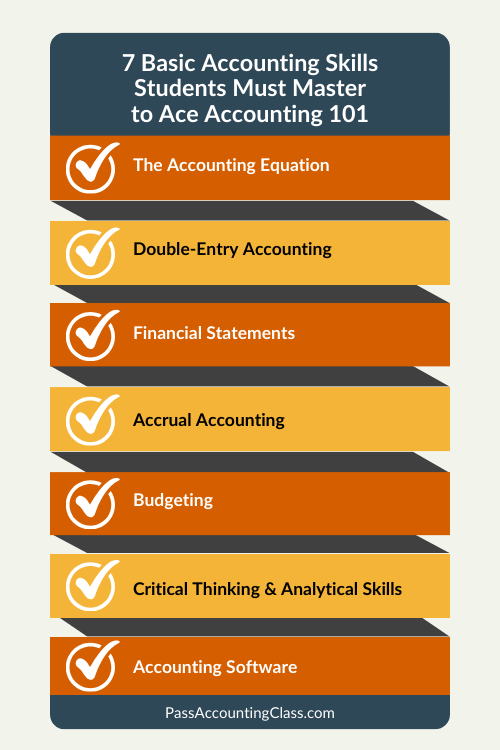If you’re considering diving into the business world, you should begin by understanding accounting. It’s what keeps businesses running smoothly. Will you be taking Accounting 101? It’s your ticket to understanding how money flows in and out of businesses and what makes them tick. You’ll need to nail some essential accounting skills to do well in this class and build a strong base for all the cool stuff you’ll learn later. Let’s break down those basic accounting skills into bite-sized pieces so you can start your journey on the right foot, tackle your accounting class head-on, and feel confident about it.
7 Basic Accounting Skills Essential for Success in Accounting 101
Understanding the Accounting Equation
At the heart of accounting lies the simple yet profound equation: Assets = Liabilities + Equity. It’s a fancy way of saying that what a company owns (assets) is bought by either borrowing money (liabilities) or using the money invested by owners or money the company’s already made (equity).
This foundational concept is the cornerstone of financial accounting, providing a framework for recording and analyzing financial activities.
The golden rule of accounting is to ensure that the accounting equation balances each time financial activities are recorded.
A solid understanding of the accounting equation is crucial because it ensures the accuracy of financial statements that reflect a company’s financial health. The practical examples in accounting homework, quizzes, and exams will provide opportunities to apply the equation to various scenarios and help you master this essential skill.
Double-Entry Accounting: The Heart of Keeping Track
Double-entry accounting requires that, for every transaction, there must be at least one debit and at least one credit to maintain the balance of the accounting equation. In other words, it’s all about making sure that for every action, there’s an equal and opposite reaction (thanks, Newton!). So, if you spend some cash (a credit), you must also show where that cash went (a debit).
Practicing with simple transactions helps students understand how to record transactions correctly, distinguish between debits and credits, and build the accuracy and attention to detail necessary for accounting success.
Proficiency With Financial Statements
Next up, you need to understand the “big three” financial documents: the Balance Sheet, Income Statement, and Cash Flow Statement. These are like a report card for a company, showing how much money it has, how much it made, and how much cash is actually moving in and out. Business owners and other stakeholders like banks, vendors, and investors use this information as the basis for key business decisions. Learning how to prepare and interpret these statements is vital to seeing the bigger picture that makes informed business decisions possible.
Grasping the Basics of Accrual Basis Accounting
Accrual-basis accounting is like keeping score of what you’ve earned and what you owe, regardless of when cash changes hands. Most businesses prefer the accrual method because it helps give a more accurate picture of a company’s financial health than cash-basis accounting, even though it is a bit more complex.
The accrual method requires creating journal entries to ensure that income and expenses are matched in the correct accounting period, keeping the accounting equation balanced. Developing this important financial skill requires practice.
Effective Budgeting Skills
Budgeting isn’t just for personal finance; businesses need it, too. It’s all about making a strategic plan for how to spend your money and allocate resources, keeping track of how you’re doing, and making adjustments as needed to help you reach your goals. Getting good at budgeting means you can help businesses plan for success and make adjustments when things don’t go as planned.
These skills are indispensable for future accounting professionals and business leaders aiming to optimize financial performance.
Critical Thinking and Analytical Skills
Analytical skills enable accounting professionals to evaluate financial information, identifying trends, anomalies, and opportunities for improvement. Critical thinking skills allow business professionals to understand and address a variety of situations based on available facts and information, define and troubleshoot problems, and develop and communicate creative solutions that move a business toward its goals.
The ability to look at numbers and figure out what they’re telling you is a superpower in accounting and business in general. Analyzing financial ratios and trends helps you understand a business’s health and direction. Practice this, and you’ll be able to spot opportunities or problems before anyone else and provide strategic advice.
Embracing Accounting Software Proficiency
In today’s digital age, proficiency in accounting software is indispensable. Tools like QuickBooks, Xero, and others streamline the accounting process, offering efficient ways to record transactions, analyze financial data, and prepare financial statements. Software is a valuable tool that can save you a ton of time and make accounting tasks much easier. So, learning popular accounting software is another crucial skill for students who want to ace their accounting classes and get a leg up on their competition.

Conclusion
Mastering these basic accounting skills is your first step to acing Accounting 101 and setting yourself up for all the exciting stuff ahead. Remember, it’s all about building a solid foundation now – which includes a robust understanding of accounting principles, the best accounting practices, and popular accounting software and tools – so you can tackle more challenging and interesting problems down the line.
Don’t stop here! Dive into tutorials and test prep resources, join study groups, and get personalized tutoring to boost your accounting skills. Every bit of effort you put in now will pay off big time in the future. So, what are you waiting for? Let’s get started on mastering the basics of accounting and rock Accounting 101!
